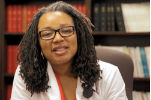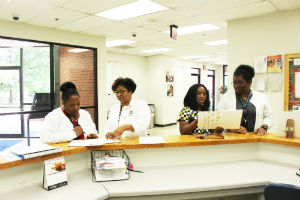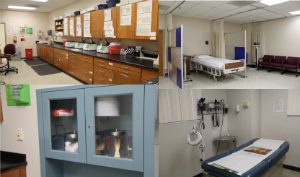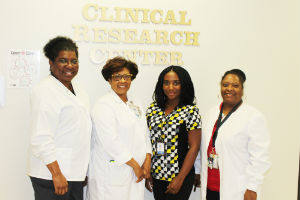Ultrasound Core Laboratory
The Ultrasound Core Laboratory (UCL) has been reorganized and is now the Noninvasive Cardiovascular Ultrasound and Hemodynamic Laboratory. This reorganization consolidates all cardiovascular studies, pulmonary function studies and noninvasive hemodynamics under the same core lab.
Hypertension and heart failure are the research areas of focus of the Cardiovascular Group at MSM. The cardiovascular ultrasound-imaging core is a key component of the cardiovascular research infrastructure in evaluating the mechanisms of heart muscle and blood vessels changes in hypertension and its complications.
Director: Rigobert Lapu-Bula, MD, PhD is an Assistant Professor in the Department of Medicine, Section of Cardiology. By virtue of his doctoral training in cardiology, he has a long-standing interest and extensive experience in the use of echocardiographic techniques in evaluating the mechanisms and outcomes of congestive heart failure (CHF). His experience in cardiovascular-hemodynamics and exercise physiology has helped establish the Ultrasound Core.
Dr. Lapu Bula has been looking at the relationship between eNOS polymorphisms, endothelial derived flow mediated dilation, left ventricular hypertrophy and myocardial blood flow in hypertensive subjects. He is also continuing his pilot work on myocardial blood flow abnormalities using a new model of salt-sensitivity and pre-hypertension.
Cardiologists: Elizabeth Ofili , MD, MPH (Chief, Section of Cardiology and Director, CRC), Adefisayo Oduwole, MD ( Associate Professor of Medicine ), Anekwe Onwuanyi MD(Associate Professors of Medicine ). These cardiologists are board-certified with advanced training and experience in interpreting echocardiograms and conducting hemodynamic/echo stress testing.
Manager: Vonsina Clark, RDCS is a Registered Diagnostic Cardiac Sonographer with over 15 years of experience in the field of ultrasound. She is certified by the American Registry of Diagnostic Sonographers and received initial echocardiography training at Wake Forest University. She is trained in the areas of Carotid and Peripheral Vascular Duplex/Color Flow Imaging at Gulfcoast Ultrasound Institute.
As a senior sonographer, she participates in supporting clinical research services involving NIH and pharmaceutical sponsored Phase I clinical trials in congestive heart failure. (Bidil XR, Commander, Paragon). Pulmonary hypertension in persons with HIV (PAH), American Heart Association collaboration between Emory and Morehouse School of Medicine with a focus on cardiovascular health and resilience among African Americans with evaluation of vascular function and intima media thickness (MECA). (P4 - Women’s Health registry) assessment of factors influencing the development and progression of Cardiovascular disease in women’s throughout their life span.
Engaging in clinical research and providing diagnostic imaging support at our primary and specialty care practice at Morehouse Healthcare. In which the echocardiography lab has been recognized as an accredited laboratory by IAC the Inter-societal Accreditation Commission since 2009. www.intersocietal.org/echo/
Goals and Objectives: The purpose of the Noninvasive Cardiovascular Ultrasound and Hemodynamic Laboratory is to provide the technical and analytical support for various research projects in which the modality of cardiovascular ultrasound imaging is employed in humans. Specific objectives are:
- To provide high quality cardiovascular ultrasound procedures, which adhere to the established protocols of the given clinical research project.
- To expand the capabilities of the Ultrasound Core Lab to be able to analyze and manage cardiovascular ultrasound studies and data from designated remote clinical sites, with the Core Lab serving as the coordinating center.
- To integrate other CRC physiological resources into the "Non-invasive Cardiovascular Ultrasound and Hemodynamic Laboratory" thereby supporting a broader base of investigators.
Facilities and Equipment: The CRC Ultrasound Core Laboratory is a Digital Echo Lab. The digital image acquisition unit performs full digital recording from any echo system from designated remote sites to acquire full study data (including stress echo studies) with audio as well as single-frame capture for Doppler, M-mode and text screens. Dedicated core lab echocardiographic equipment consists of cutting-edge ultrasound imaging instruments, super- VHS video player/recorders, industrial grade color video monitors, digital frame grabbers, digital image archiving (storage/retrieval), digital imaging network, and high quality grade color page printers.
The center GE Vivid E9 and the Logiq S7 - ultrasound system was recently installed for all cardiac and vascular reactivity ultrasound studies. This GE upgrade allows output of digitally acquired images from the echo-system to a customized networked cardiovascular workstation (EchoPac) for off-line review/analysis.
Additional equipment for various vascular and hemodynamic testing/monitoring modalities expand the Ultrasound Core capability to a comprehensive performance Core Lab.
Training: The Core Director supervises the training of the technical staff. Training is conducted primarily at the Core Laboratory, and includes didactic and supervised "hands-on" learning, individually or in small groups. Training provides the study site ultrasonographer with the rationale, significance and technique of the ultrasound procedure.
Specific objectives include but not limited to: a) to correctly perform the sequence of tasks for the brachial artery ultrasound procedure; b) to acquire high-quality images for analysis by the Core Laboratory Directors; c) to avoid sources of variability in image acquisition, measurement error, and artifacts; d) to properly collect and record the study data; e) to properly label and ship videocassette tapes, CDs, images, and forms to the Core Laboratory; f) to maintain communication with the Core Laboratory regarding the technique and/or brachial ultrasound procedure.
Image acquisition is standardized. Operators (including senior sonographer, cardiologist or staff fellow) perform the same procedures using the same approach, patient position, machine setting and recording criteria in accordance with existing recommendations, mainly those of the American Society of Echocardiography. During ultrasound examination, the operator performs direct measurements of structure/diameters (M-mode or two-dimensional modalities) as well as of the Doppler signals, using on-line electronic calipers and tape-recording the whole procedure in addition to the digital clips.
The Images are stored in our secured central image network server (ImageVault) then reviewed on video or digital format by one of the cardiologists in the presence of the operator/senior sonographer or staff member participating in the acquisition sessions. In our lab, off-line revisions of clinical echo examinations are routinely performed for both teaching purposes and quality improvement. Total quality management of the Core Lab services has been connected with our comprehensive system of quality assurance, which integrates quality development, quality maintenance, and quality improvement. Each study is completed with a formal written report and interpretation. This report is kept on file with copies of image documentation (paper and/or tape or optical disk or server) for review or offline analysis.
List of Tests and Services:
- Cardiac and Vascular Imaging
- Transthoracic Echocardiography
- Quantitative Analysis of Echocardiograms
- Doppler Tissue Imaging (DTI)
- Myocardial Contrast Echocardiography (MCE)
- Dobutamine Stress Echocardiography
- Exercise Stress Echocardiography
- Brachial Artery Ultrasound Imaging
- Finger Plethysmography
- Carotid Ultrasound Imaging
- Vascular Compliance/Stiffness Pulse-Wave Analysi
- Stress Testing and Cardiovascular Hemodynamics
- Exercise ECG Stress Testing
- Maximal O 2 Uptake Testing
- Respiratory Energy Expenditure
- Twelve-Lead Electrocardiography (ECG)
- Tilt-Testing
- T-Wave Alternans
- Ambulatory Blood Pressure Monitoring
- Holter Monitoring
- Cardiovascular Hemodynamics
Analytical Chemistry and Protein Profiling Core
Since the 1996 Olympics in Atlanta, the Analytical Chemistry and Protein Profiling/2D Gel Laboratory has operated as a shared facility between the Department of Pharmacology and Toxicology and the Clinical Research Center. In addition, investigators from the NASA Space Medicine and Life Sciences Research Center at Morehouse School of Medicine also extensively used the analytical chemistry laboratory. The CRC has recently realigned and consolidated the analytical core with the proteomics core laboratories to become the Analytical and Protein-Profiling Core, a virtual umbrella or super core, similar to other institutional research cores. For both basic and clinical investigators, the Analytical and Protein Profiling Laboratory will be a multifunctional resource providing analytical consultation, help in the preparation of manuscripts and proposals as well as sample analysis. This administrative structure ensures uniformity in investigator utilization, a common platform for marketing of services, thus promoting access, and increased utilization. The revised structure also allows investigators to access and view all MSM research core labs “at a glance”. Problems arising due to variations in methods between laboratories can be avoided.
The Analytical Chemistry and Protein Profiling Core is comprised of three primary labs:
Analytical Chemistry
Protein Profiling/2D Gel
2D Gel Electrophoresis Lab
Analytical Chemistry Lab (ACL) provides custom analytical support for clinical, basic and transitional research. The services that the ACL routinely performs include analysis via: 1) HPLC, 2) ELISA and colorimetric testing and 3) Electrolytes analyses. In addition to providing analytical support, the ACL provides consults on analytical techniques, sample requirements, etc. to the investigators throughout the project (from concept to completion).
Protein Profiling Lab offers services such as protein identification and analysis of protein modifications. It houses a Surface Enhanced Laser Desorption-Ionization (SELDI) mass spectrometer, and a Thermo-Finnigan LTQ LC/MS/MS system. SELDI is a mass spectrometry technique used to analyze proteins and other complex mixtures of biomolecules. This core lab also has a BioPlex bead sorter, which allows the analysis of multiplex assays such as ELISAs from a single, small volume sample.
2D Gel Electrophoresis Lab works in conjunction with the Protein Profiling lab and offers differential protein expression analysis by both gel and LC analysis. Within this lab is a BioRad automated spot picker (Proteome Works) and a BioRad gel imager (Molecular imager FX).
For more information and service charges, contact:
Dr. Michael Powell
Proteomics Core Leader
Phone: (404) 752-1582
Email:
Dr. Winston Thompson
2D Gel Electrophonesis Core Leader
Phone: (404) 752-1715
Email:
Laboratory Manager
Phone: (404) 756-5707
Email: @msm.edu
Analytical Core
You must have the Adobe Flash Player installed to view this player.
Analytical Chemistry
The primary focus of the Analytical Chemistry Laboratory is to provide reliable and comprehensive analytical services to basic and clinical researchers. These services include:
- Custom sample analysis by High-performance liquid chromatography (HPLC).
- ELISA
- Electrolytes analyses
- Sample preparation (derivatization and extraction/purification)
- Data reports and QC reports
- Consultation in analytical techniques and methodology
Equipment/Technology
- High Performance Liquid Chromatography (HPLC): Custom analyses by HPLC can include (but not limited to): amino acids; thiols (total, oxidized, reduced); chiral and racemic compounds such as warfarin and clenbuterol; etc.
- Agilent 1100 series HPLC equipped with a diode array detector (DAD), variable wavelength detector (VWD), 1046 series fluorescence detector.
- Agilent 1100 series HPLC system equipped with 1100 series fluorescence detector.
- Molecular Devices SpectroMax Plus microtiter plate reader and variable wavelength UV-Visible spectrophotometer to perform Colorimetric and Enzyme-linked Immunosorbent assays.
- NOVA Electrolytes Analyzer for analyses of Na+, P+, TCa+, Li+, Cl- in biological fluids.
Service Charges
The Analytical Chemistry Laboratory performs custom testing and has a standard fee schedule for services. The fee structure is based on the amount of time required to process the samples (extraction, derivatization, etc.) and the cost of supplies and reagents. For non-NIH sponsored projects (MSM and outside institutions and corporations), labor costs are assessed. A complete listing of currently available tests or cost per requested assay can be emailed or faxed upon request. Additionally, since the Analytical Chemistry Laboratory performs custom testing, if the requested assay is not on the list, please contact the core leader directly for test availability and the most up-to-date pricing.
Contact Information
Dr. Michael Powell
Proteomics Core Leader
Phone: (404) 752-1582
Email:
Clinical Research Center (CRC) Nursing Core
Overview
The Nursing Core staff is a significant part of the infrastructure of the Clinical Research Center (CRC). This group is made up of nurses, research coordinators, research assistants, and laboratory technicians. These medical professionals come from many backgrounds and provide a diverse body of knowledge and experience in various medical specialties.
 |
|
| Priscilla Pemu, MD, MSCR | |
| Medical Director/e-Health | Diretor of Clinical Studies and Operations |
| Phone: 404-756-6684 | Phone: 404-756-5780 |
| E-Mail: |
E-Mail: |



